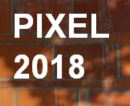Speaker
Description
Monolithic active pixel sensors (MAPS) based on commercial
high-voltage CMOS processes are an exciting technology that is
considered as an option for the ATLAS inner tracker upgrade. Here,
particles are detected using deep n-wells on a p-type substrate as
sensor diodes with the depleted region extending into the silicon
bulk. With readout electronics and sensor integrated on the same
device, the detector complexity and the material budget are greatly
reduced. The ATLASPix1 pixel sensor prototype is a large-scale
pre-production monolithic prototype that implements the full readout
chain on a single physical chip. It is based on a large sensor
electrode and is produced using the ams aH18 high voltage
technology. Three pixel matrices with different readout
architectures, triggered and untriggered, and pixel designs are
implemented. We will show a systematic performance evaluation of
this prototype for unirradiated and irradiated samples of up to
$10^{15} n_{eq}/cm^2$, discuss its applicability as an option for the
ATLAS inner tracker upgrade, and outline the future plans.




